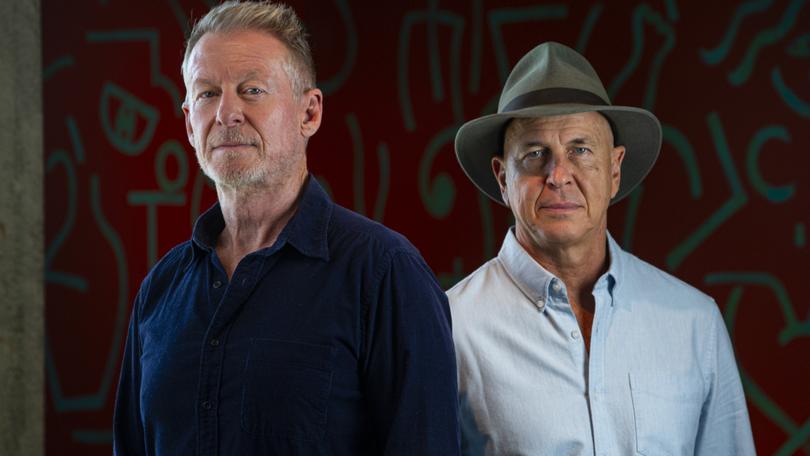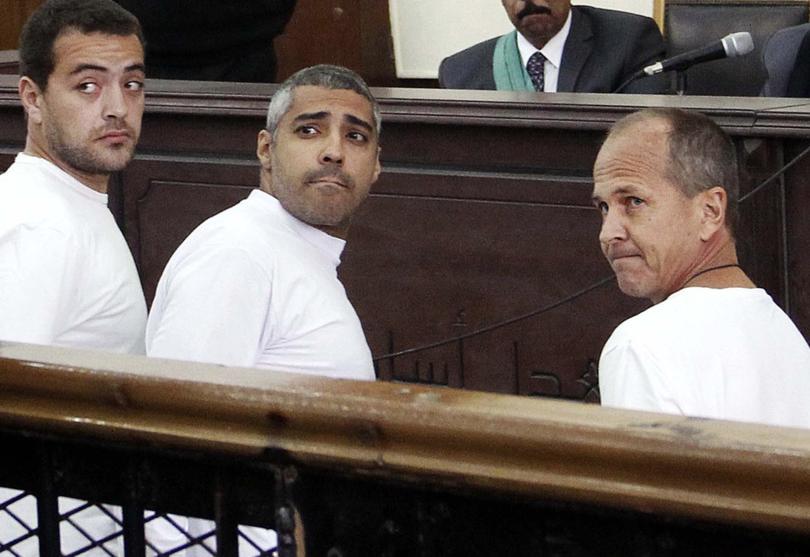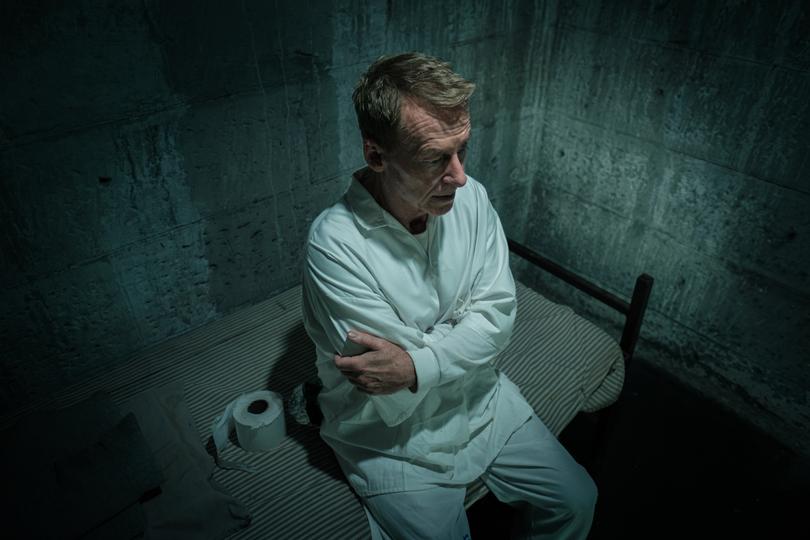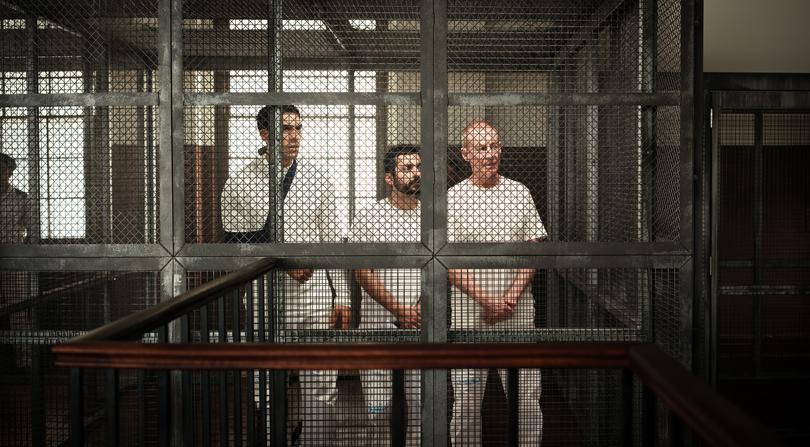The Correspondent movie: Peter Greste, Richard Roxburgh and Kriv Stenders tackle press freedom drama
When Peter Greste was arrested in 2013, it was in the context of the War on Terror. Today, those same battles are still being fought, but through a different lens.

Journalist Peter Greste and filmmaker Kriv Stenders’ fathers have known each other for a long time.
Their dads met decades ago as refugees from Latvia, settled in Brisbane and both worked as architects. When Greste was telling his father about the producers who were intent on turning his book, The First Casualty, into a film, his old man offered to help.
“I was telling my father about how we’re looking for a director, and how Carmel Travers, the producer, thinks she’s got one, my dad says, ‘Look, if you need some help, my old friend, his son is in the movie business’,” Greste told The Nightly. He said to his dad that it was under control.
Sign up to The Nightly's newsletters.
Get the first look at the digital newspaper, curated daily stories and breaking headlines delivered to your inbox.
By continuing you agree to our Terms and Privacy Policy.As it happens, Stenders was already the name in mind. When the director got the call and was asked if he knew anything about Greste and his story, he was able to tell the producer that they’ve known each other since their childhoods.
“It was a strange coincidence,” Stenders said. “It was meant to be. I would’ve been involved in the project either way but it was one of those karmic things that just felt really good.”
The Correspondent, adapted from Greste’s book and experiences, is out this week, with Richard Roxburgh playing the famed journalist who was arrested in December, 2013 in Cairo when he was working for Al Jazeera.

It’s a story many Australians know well, and it was one Roxburgh followed at the time. The actor said, “It’s an extraordinary drama about an Australian citizen doing his job for a couple of weeks in Egypt, and then he was dragged off the streets and charged with terrorism and sentenced to seven years.”
It had all the makings of a great film, one that would be entertaining as well as revealing.
The Correspondent was filmed in New South Wales – Roxburgh described the shoot as “intense” - and the day Greste visited set, the production using the old mental institution in Callan Park, Rozelle, as a double for the Egyptian prison.
“The thing that struck me about that place is, there must be some sort of standard prison blueprint that the British Foreign Office has sitting on a shelf somewhere that they used to send out to all the colonies every time they want to build something like that, whether it’s Egypt, Australia or South Africa,” Greste said.
“It really did feel as though I was walking straight back in. Obviously little details are different, but the fundamental design, the architecture, the feel of the place was bang on.”
He observed a scene between Roxburgh and Julian Maroun, who played Mohamed Fahmy, an Al Jazeera journalist who was arrested with Greste, and recalled it being a tough experience.
“It was really difficult for me to watch because I thought, ‘F—k, it was like being in those nightmares where just hover above yourself and you see yourself heading for imminent disaster, and you’re just powerless to stop it.”

At the other end of the spectrum, Greste was also thrown by background actors dressed as Egyptian prison guarded and kitted out with fake AK-47s coming up to him with big smiles and asking for selfies.
Even though Greste’s experiences had been covered by Australian and international media at the time, and he has written two books, the film adds a different dimension to the tale.
Told from a first-person perspective, it charts his time from the moment of his arrest to when he is released, but interwoven are flashbacks to a 2005 incident in Somalia involving British journalist Kate Peyton.
Stenders explained, “Unlike every other kind of prison movie or movie like this, Peter doesn’t get tortured, he isn’t rescued and he doesn’t escape. So, there’s no climactic or (physical) ordeal he goes through, but he does go through an ideal, which is a psychological one.”
That choice to intersect two stories not only provides emotional texture, it also emphasises the film’s other raison d’etre (the primary one being to entertain), and that’s a defence of journalism and the risks associated with the job.
When Greste was arrested, it was five years after the Arab Spring and 12 years after September 11. At that time, political and social discourse around the world was dominated by the spectre of terrorism.
“When George W. Bush started the War on Terror, that licenced governments to use that terrorism and the rhetoric of terrorism and national security to come after uncomfortable journalism.
“It was a war of ideas, and the space where ideas are transmitted becomes part of the battlefield.”

When Greste was writing his books, he wanted to get them out quickly because his analysis of the situation traced back to September 11 and he thought that rhetoric would become old, and that journalism would recover its place in democracy.
That’s not how it played out. The Correspondent is being released at a time when journalistic persecution is distressingly relevant and urgent.
Associated Press is being denied access by the Trump Administration, 124 journalists, including 82 in Gaza, were killed in 2024, and public media is being defunded or threatened around the world.
“Right now, there are more journalists in prison, more being killed than ever before,” Greste said. “Donald Trump is stomping all over media freedom, freedom of speech, the (US) First Amendment.”
At home, Australia has slipped to 39th in World Press Freedom Index, down from 12th in 2002.
“I think we lost sight of how much we’ve changed in the past decade or so, and what the film does is invite us to think about those bigger issues around the kind of society that we have and the role of the media in helping us navigate those sorts of issues,” Greste said.
“It’s the kind of thing that organically raises those issues, and people naturally come away from it wanting to have these kinds of conversations.”
The Correspondent is in cinemas on April 17.

